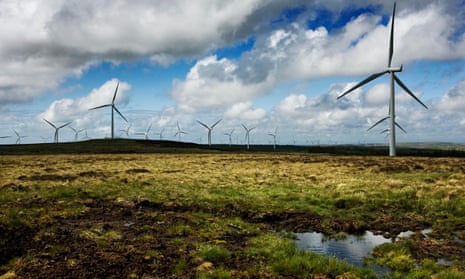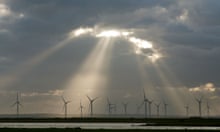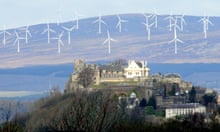In his campaign to stamp out onshore wind power, communities and local government secretary Eric Pickles has just halted his 50th onshore wind project. Accused by Labour and Lib Dems of exceeding his powers, he overrides local planning systems and inspectors, pulling 85% of wind energy capacity out of the standard process for purely political purposes.
Just as onshore wind becomes the cheapest renewable energy source, the Conservatives have committed to effectively abolishing it: their manifesto will pledge to remove subsidies, jeopardising future investment and rural jobs. Small local nimby groups find Pickles ever-eager to block windfarms in their back yards. That’s despite overwhelming public support, where poll after poll finds two thirds are in favour of onshore windfarms, including in their own districts, surprisingly resistant to the vigorous climate-change denial and anti-windfarm campaign by the Conservatives and their press.
You might think people living somewhere that has suffered extreme flooding, almost certainly climate-change related, would welcome wind turbines in their district. But no, not in the Somerset levels. Remember last winter, when reporters in waders filled the nightly news for weeks as the river Parrett burst its banks and flooded hundreds of homes. Prince Charles arrived in green wellies and pronounced it “a tragedy” that more had not been done. That brought David Cameron hurrying along in his wellies too, calling it a “biblical” flood. He promised that “everything than can be done will be done” – except, it seems, clean energy.
Local Tory MP Ian Liddell-Grainger blamed Chris Smith, chair of the Environment Agency – conveniently a former Labour minister – calling him “a little git” and a “coward” and said that he’d “stick his head down the loo and flush”. That’s perhaps the sort of thing a public school, ex-army, great-great-great-grandson of Queen Victoria does: he’s chair of the Commons energy committee and an anti-wind campaigner too.
In all of Somerset there is just one wind turbine, so you might think the proposal by Ecotricity to put up a modest four in the Parrett valley would have had a fair wind. It would power 6,769 homes. But no, it was opposed by a small local group – and Pickles “recovered” the application and turned it down. I went to look at the aptly named Black Ditch site, and this is no beauty spot: in fact it would be hard to find a duller patch of England.
It sits beside the busy M5 motorway, by a demolished Royal Ordnance factory and a man-made river channel that used to service wartime munitions-making. This dreary strip of flat lands is crisscrossed in all directions by enormous pylons bestriding the countryside, carrying electricity from the nearby Hinkley Point nuclear power station across fields where shrink-wrapped black plastic hay bales litter the landscape.
But pylons and plastic stir none of the deep politics of wind turbines which have become symbols in the warfare between climate preservers (left) and climate-change deniers (right). Beauty is in the eye of the beholder – so to the Ukip/Mail/Telegraph/Tory MP faction they are monstrosities. To many others, the sight of those great slow-turning white sails raises their spirits as a symbol of hope. But this is an unbridgeable divide, in politics and in aesthetics, the two closely allied.
Not long ago Cameron was the man fixing a wind turbine to his roof, promising “the greenest government ever”. He knew then that wind power was popular – and it still is. So what’s changed? Two things: a hefty slice of his party has taken leave of its senses and is now speeding on high-octane ideology, regardless of all road signs pointing to public opinion, let alone national interest.
Climate-change denial is a symptom of the frenzy – 101 Tory MPs signed up to it with Nigel Lawson, the former chancellor, and Owen Paterson, the former environment secretary, stirring up windfarm aversion. But the great game-changer has been the arrival of Ukip, with its three main aims – out of Europe, end immigration and, oddly, a ban onshore turbines, which put the wind up Cameron.
However, 40% of Ukip voters support onshore wind and I doubt many votes in the recent Clacton byelection were moved by turbine phobia. On the contrary, you would expect their voters to rally to the cause of home-grown energy, freeing us from dependency on risky foreign potentates or pesky French neighbours. Comres, polling for RenewableUK finds parties opposing onshore wind lose twice as many votes as they gain. In the 40 most marginal Labour and Conservative seats, opposing onshore wind loses four times votes as many as it gains, and more voters for all three main parties are turned off by anti-wind attitudes.
Pickles’s blocking of windfarms in the last year has lost over £500m in income and 2,000 scarce rural jobs, killing off investment in an industry providing the cheapest renewables. The EU has just reported that onshore wind is cheaper than coal, gas and nuclear energy when the cost of pollution is factored in, especially the high cost of climate change.
Both Tory and Lib Dems promised that nuclear would get no extra subsidy: but EDF building at Hinkley C has been guaranteed a 10% profit for 30 years – and no one adds in the vast insurance bill they would bear if the state didn’t underwrite nuclear disaster. This isn’t an argument against nuclear, which is needed in the mix, but a reminder of how cheap onshore wind has become – the price would fall ever faster if only Pickles were stopped.
Once he called himself a champion of localism, but now he removes decisions from the local planning process, unless he agrees with them. When it comes to fracking – highly unpopular, especially in marginals – the government legislates to ride roughshod over huge local objections.
Labour has been vociferous, and so has the wind industry, but they say it’s impossible to get this story into anywhere but the Guardian, the Financial Times and the Independent: the rest are climate-change deniers and onshore wind refusers. The Tory retreat from the cheapest clean energy is another sign of their retreat from reality, on climate change as on the EU.







